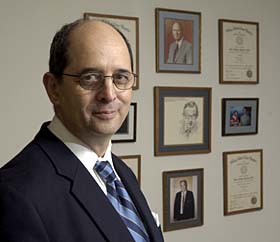For more archives, go to the Advance Archive/Search Page.
International Road Safety Focus
Of Orthopaedist's Talk At UN
Each day more than 2,700 deaths occur worldwide as the result of road accidents. Although almost 120 of those deaths happen in the United States, the problem is worse in developing countries, where roads are shared by pedestrians, animals, bicycles, and all types of four-wheel vehicles. Public transport in many countries is notorious for overloading, and mini-buses are dubbed 'flying coffins' and 'moving morgues.'
 |
|
Dr. Bruce Browner, chair of the Health Center's
orthopaedics department, is playing a key role in a global effort to raise
awareness of road safety. Photo by Peter Morenus
|
"We are talking about a problem of epidemic proportions," says Dr. Bruce Browner, chairman of the Department of Orthopaedics at the Health Center. "I was surprised when I first learned about the magnitude of death and injury caused by road accidents, and how much worse this problem was in developing countries, which account for 85 percent of the crashes. I thought, 'After 20 years of specializing in ortho-paedic trauma, I don't know about the extent of this problem. What about the rest of the medical community?'"
As a representative of the Bone and Joint Decade 2000-2010, an international effort to raise awareness about the significance and cost of musculoskeletal disorders, Browner will soon be addressing the role of the Bone and Joint Decade and the American Academy of Orthopaedic Surgeons in placing road safety on the United Nations' agenda. He will be speaking at a U.N.-sponsored Stakeholder's Forum, "Global Road Safety - A Shared Responsibility," on April 15 in New York City.
The forum, and a half-day meeting of the U.N. General Assembly to be held on April 14, are coming to fruition after months of high-level networking. In his role as chairman of the academy's International Committee, Browner came to know Dr. Wahid Al-Kharusi of Oman, the deputy secretary general of the Pan Arab Ortho-paedic Association and orthopaedic surgeon to the Sultan of Oman.
The Sultan was interested in improving road safety in Oman, and brought the issue to the attention of Oman's Ambassador to the U.N., Fuad Mubarak Al-Hinai. Al-Hinai became a passionate advocate for road safety within the U.N., and it was through his support and drive that resolutions were passed placing road safety on the U.N. agenda and calling for the half-day session and the forum.
U.N. Secretary General Kofi Annan; World Health Organization Director General Dr. Jong-Wook Lee; high level officials from the World Bank, UNICEF, and United Nations Development Programme; and U.S. Transportation Secretary Norman Mineta will be speakers at the General Assembly session.
The forum will bring together leaders from safety and health organizations around the world, to discuss the problem and consider collaborative actions to reach solutions.
Issues to be addressed at the forum include the incidence of road traffic injuries and safety matters, as well as panel discussions on what governments, the private sector, society, and countries can do to promote road safety. Presentations will be made by experts from 16 countries in Europe, Africa, and North and South America.
One of the main obstacles to road safety is the lack of public awareness of the magnitude of the problem and its preventability. "It's a neglected epidemic," Browner says. "People die one or two at a time, and because of the distributed nature of the deaths and injuries, it is simply not noticed. We're working to change that."
Others are as well. The annual WHO World Health Day, April 7, was dedicated this year to the theme "Road Safety is No Accident;" and WHO, along with the World Bank, released a study titled World Report on Road Traffic Injury Prevention.
"This forum is being looked upon as the beginning of international campaigns to control the global road traffic injury epidemic," says Browner. "There is much work to be done here in the United States. More than 40,000 people die each year on our roads, and three times as many are seriously injured and disabled.
"As first-hand witnesses to this carnage, orthopaedic surgeons have moral clout that can be used to control the problem at home and abroad," he adds. "To effect change, we must leave the operating room and participate actively in advocacy, international education, and volunteerism."

